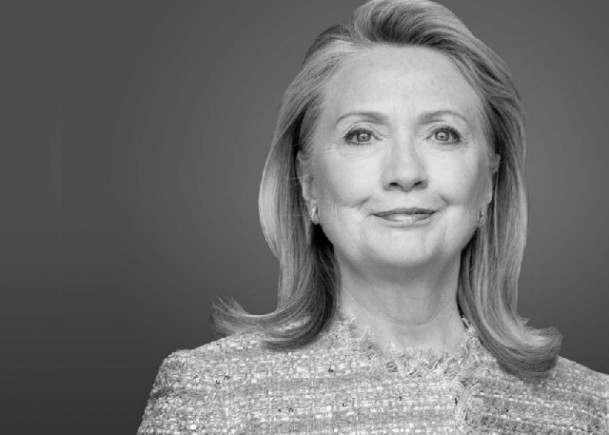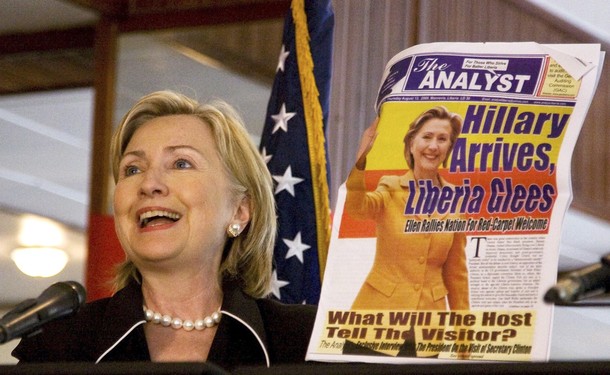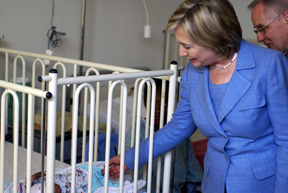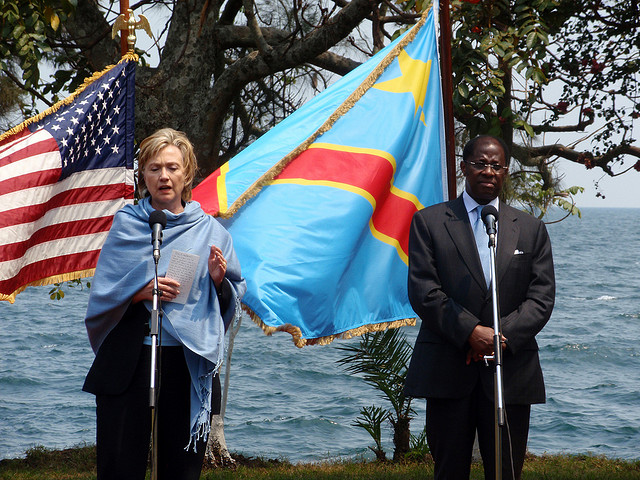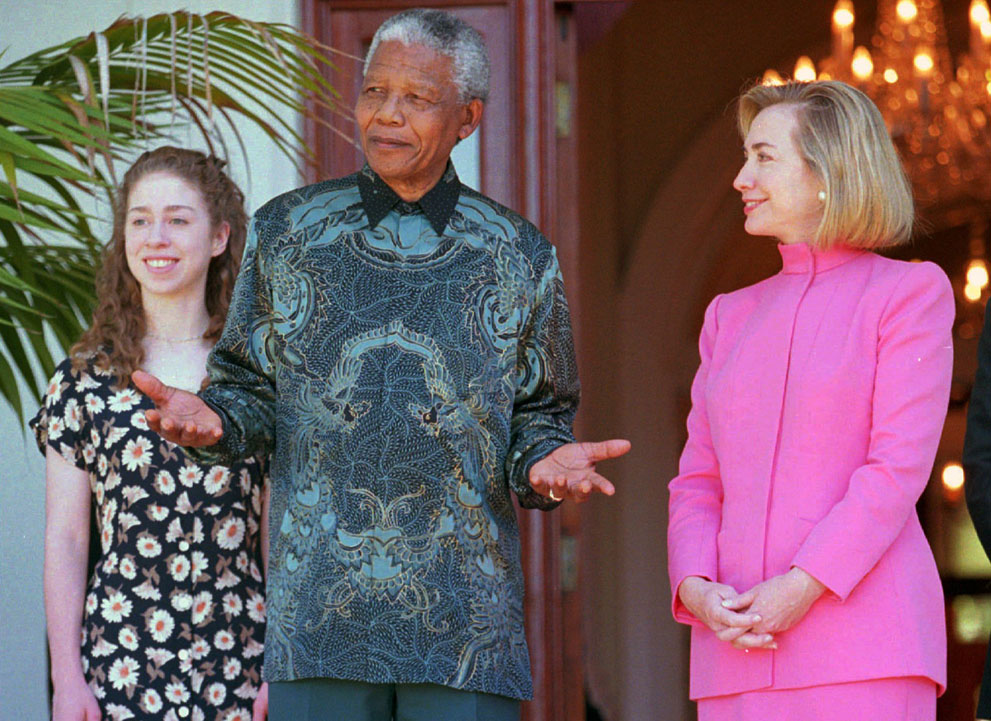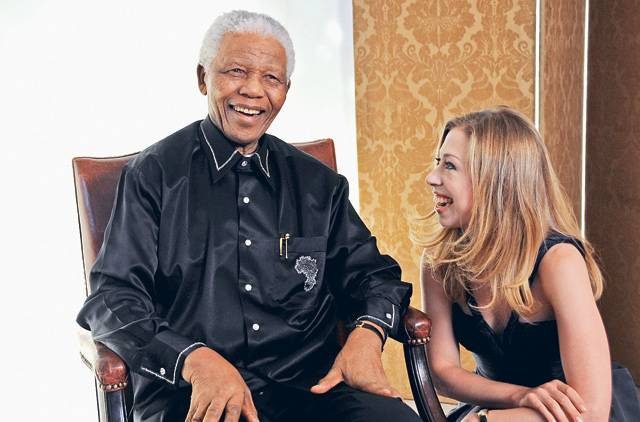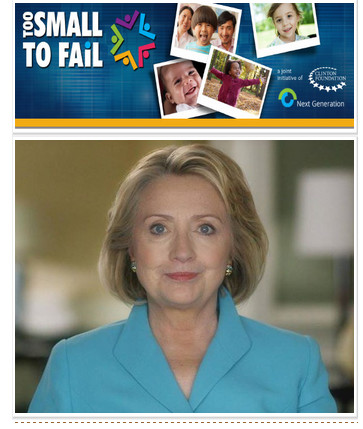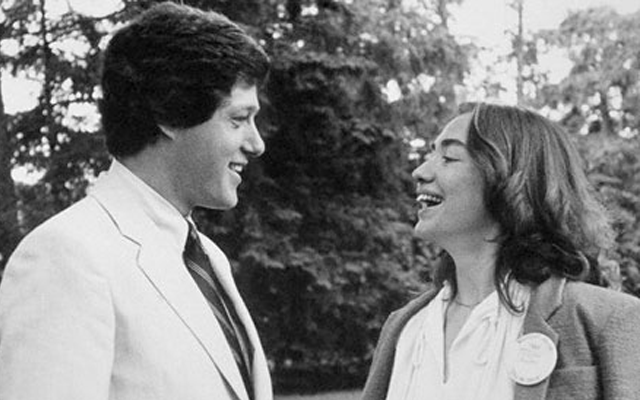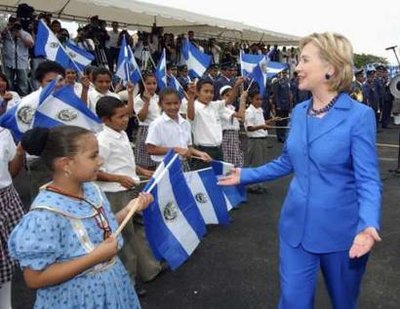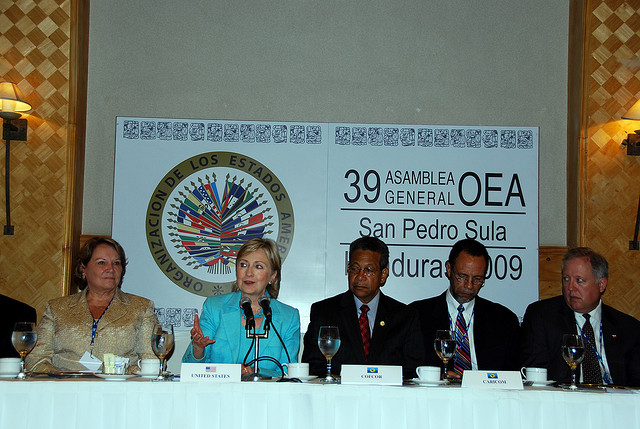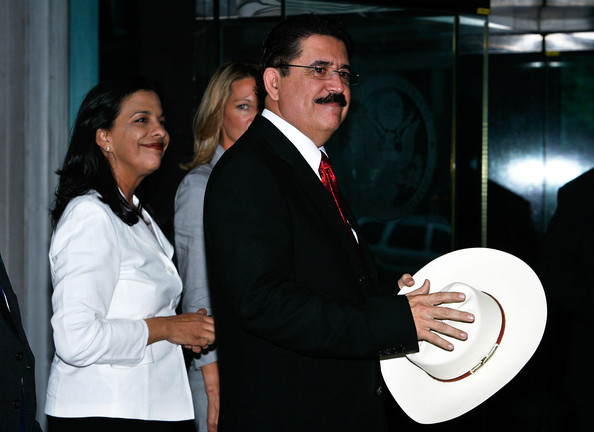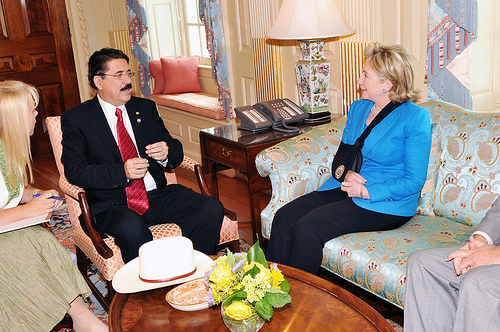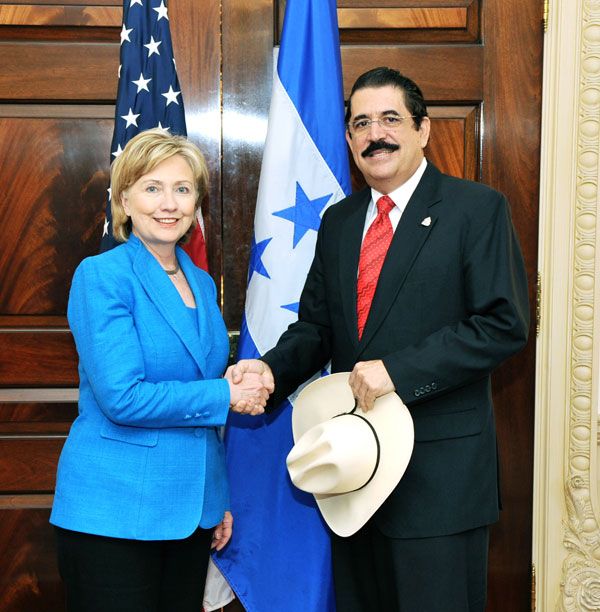Special Event: Remarks by Former U.S. Secretary of State Hillary Rodham Clinton
October 6, 2014Hillary Rodham Clinton, Former U.S. Secretary of State and Former U.S. Senator from New York will deliver keynote remarks at a special luncheon hosted by Canada 2020 in Ottawa.
Click here for more information on attending this event.
Monday, October 6th, 2014
After nearly four decades of public service as an advocate for children and families, First Lady, Senator, and U.S. Secretary of State, Hillary Rodham Clinton now helps lead the Bill, Hillary & Chelsea Clinton Foundation. She is also the author of the new book, Hard Choices, which chronicles her efforts to restore America’s leadership after eight years in which it was badly eroded.
Ottawa Convention Centre, Canada Hall 1 & 2
Luncheon Event, 12:30 to 3:00 PM
Join Canada 2020 for this special luncheon event featuring a keynote address from Secretary Clinton followed bas well as an on-stage Q&A.
For more information on how to attend this event, click here:
Saturday, August 30, 2014
Hillary Clinton to Speak in Ottowa in October
Hillary Clinton’s ‘Hard Choices’ Retrospective Part Four Chapter 13 Africa: Guns or Growth?
Hillary Clinton describes the Obama Administration's Africa policy in typical Hillary fashion as resting on four pillars.
She quotes her remark to a TV interview question in Zambia in June 2011.

She mentions this speech where she spoke of sustainable partnerships that add rather than subtract value.

On the subject of the disturbing downward trend in electoral democracies on the continent she refers to a speech in 2011 at African Union Headquarters where she warned African leaders that the Arab Spring could spread. We wondered, viewing the video, why she was speaking in the dark. It turned out that there was a power outage that occurred while she spoke that might have been a coincidence. It is a message that older, entrenched leaders do not want to hear. Hillary remarks upon the reluctance of some of these leaders, often seen as liberators from colonialism, to cede power. The phenomenon is endemic on the continent.
She delivered a similar message to Arab elders at Forum for the Future in Morocco in November 2009. Neither was that audience particularly receptive to the message of inclusiveness. The Arab Spring was a reaction to policies that she knew then, through her interactions with civil society in Arab countries, would boil over sooner or later boil over. A look at the slideshow in this post speaks more than 1,000 words.

Putting forth the example of a grassroots Senegalese movement effectively defeating Abdoulaye Wade in their 2012 election, she posits that democratic change is possible in Africa and quotes further from her sustainable partnerships speech in Dakar.
Her 2009 visit to Kenya comprised several important speaking engagements to which she refers: The AGOA Forum (Clinton administration legislation), a "townterview" with Fareed Zakaria, a visit, with Agriculture Secretary Tom Vilsack, to an agricultural research institute, and the usual ministerials.


Students
greeted her with signs reading "corruption-free zone." At this event
Hillary shared the stage with Nobel Peace Prize winner Wangari Maathi
who led a reforestation movement in Kenya. The issue of natural
resources being decimated arose. You may recall that in her very
lengthy confirmation hearing before the Senate Foreign Relations Committee,
Hillary was asked a question about natural resources in Africa (it
might have come from John Kerry, but I am not certain). Immediately she
responded that "Botswana comes to mind." Here she shared the same
example.
Botswana's national trust fund has reinvested profits from its resources into the population and infrastructure with such success that both the Peace Corps and USAID pulled out of the country since their help was no longer needed. Hillary credits Botswana's Five Ds for the success: Democracy, Development, Dignity, Discipline, Delivery.






She also met with President Kibaki, Prime Minister Odinga, and the cabinet. There was tough talk, to which she refers, in this meeting but no transcript from the State Department. The agreed-upon shared power in the government was not going smoothly. Her subsequent words with Foreign Minister Wetangula provide some insight into the tone she adopted, however.
Hillary's description of her visit to Democratic Republic of Congo (DRC) in summer 2009 is a contrasting patchwork of horror and hope. She begins with her visit, with NBA star Dkembe Mutombo to the pediatric unit he built and named for his mother.

There were so many bright and lovely moments on this first official State tour of Africa. Most of those were, sadly, not covered by the media, but no one missed the "snap in the Congo." In an atmosphere that Hillary describes as sour with an air of sullen resignation in a stuffy auditorium at St. Joseph's School. everyone saw her lose patience with a question, remove her earbuds, and tell a student at a town hall that she would not be channeling her husband.


In the book, she explains that the student came to her after the event, apologized, and explained that he had not meant to ask her President Clinton's opinion but rather President Obama's.
Goma is one of the the grimmest, most dangerous places on earth, especially for women. Hillary tells of her visit there and the spirit she encountered among the residents of the refugee settlement she visited.



She says she witnessed the worst and the best of humanity there. She was inspired to chair a U.N. Security Council meeting the next month on the subject of sexual violence in conflict regions.

The surface issue was fees charged by Sudan to transport and process the oil. Hillary used an Op-Ed by one of President Kir's former comrades-in-arms, Bishop Elias Taban, once a boy soldier. Below the surface, the dispute rested on old battle wounds. Hillary told him "a percentage of something is better than a percentage of nothing." Taban's words moved Kir to accept a compromise. By 2:45 the next morning, the oil flowed again.
Bishop Taban, who provided the instrument that convinced President Kir to budge was her guest at last year's Clinton Global Initiative where she presented him with the Global Citizen Award.

She reviews Somalia's war-torn, terror-ridden history and our efforts to assist through several U.S. administrations. In August 2009, the president of the transitional government traveled to Nairobi to meet with her. She wondered if he would shake her hand, and he did so very enthusiastically which was a very big deal all around.

They met again for a final time in their respective official positions in August 2012. A new president was elected the next month.

At a military base in Uganda, U.S. Special Operations advisors showed her a surveillance drone used in the search for Joseph Kony chief of the Lord's Resistance Army and elements of Al Shabaab. She notes that it resembled a child's toy.


She mentions the September 2013 attack by Al Shabaab on a shopping mall in Nairobi that killed Elif Yavuz who worked for the Clinton Health Access Initiative which battles HIV/AIDS and other health challenges.

In the struggle to conquer HIV/AIDS on the continent, the President's Emergency Plan for AIDS Relief (PEPFAR) begun by George W. Bush plays a major role. She recalls this event in Johannesburg in 2009 where she was accompanied by Eric Goosby, the State Department's Global AIDS Coordinator, her Congressional Representative, Nita Lowey, and the late, Honorable Donald Payne who was a friend of this blog.
Hillary declared a goal of an AIDS-free generation on World AIDS Day 2011.

Hillary begins drawing this Africa chapter to a close in South Africa around Nelson Mandela beginning with recollections of her visits to South Africa as First Lady, the second time bringing Chelsea with her. A lifetime friendship ensued.

One working relationship that brought many smiles over the years was her friendship with South African Foreign Minister Maite Nkoana-Mashabane. She gave parties for Hillary on both of her visits. There was a rare snowfall on Hillary's last visit and she was called 'Nimkita' - one who brings the snow.


 Hillary led a delegation of business leaders to this summit. Our friend Grace Bennett of Inside Chappaqua accompanied Hillary's traveling press on this trip, and Hillary called her over to meet Maite.
Hillary led a delegation of business leaders to this summit. Our friend Grace Bennett of Inside Chappaqua accompanied Hillary's traveling press on this trip, and Hillary called her over to meet Maite.




She refers to these closing remarks in this speech.
Hillary went on Air Force One with the Obamas and the Bushes. Bill and Chelsea went from Rio.


Hillary ends this chapter with hopes for an Africa worthy of Nelson Mandela's long walk to freedom.
###
- Promoting opportunity and development,
- Spurring economic growth, trade, and investment,
- Advancing peace and security,
- Strengthening democratic institutions.
She quotes her remark to a TV interview question in Zambia in June 2011.
... our view is that over the long run, investments in Africa should be sustainable and for the benefit of the African people.Confronted with a suggestion that the Chinese model, basically a hands-off local government model might serve African nations better than the good-governance model that could be interpreted as imposed by the west, responded:
It is easy – and we saw that during colonial times – it is easy to come in, take out natural resources, pay off leaders, and leave. And when you leave, you don’t leave much behind for the people who are there. You don’t improve the standard of living. You don’t create a ladder of opportunity.
We don’t want to see a new colonialism in Africa. We want, when people come to Africa and make investments, we want them to do well, but we also want them to do good. We don’t want them to undermine good governance. We don’t want them to basically deal with just the top elites and, frankly, too often pay for their concessions or their opportunities to invest.
Hillary Clinton’s Media Outreach: Three Interviews from Lusaka, Zambia
June 11, 2011 by still4hill

She mentions this speech where she spoke of sustainable partnerships that add rather than subtract value.
Hillary Clinton on Building Sustainable Partnerships in Africa
August 1, 2012 by still4hill

On the subject of the disturbing downward trend in electoral democracies on the continent she refers to a speech in 2011 at African Union Headquarters where she warned African leaders that the Arab Spring could spread. We wondered, viewing the video, why she was speaking in the dark. It turned out that there was a power outage that occurred while she spoke that might have been a coincidence. It is a message that older, entrenched leaders do not want to hear. Hillary remarks upon the reluctance of some of these leaders, often seen as liberators from colonialism, to cede power. The phenomenon is endemic on the continent.
She delivered a similar message to Arab elders at Forum for the Future in Morocco in November 2009. Neither was that audience particularly receptive to the message of inclusiveness. The Arab Spring was a reaction to policies that she knew then, through her interactions with civil society in Arab countries, would boil over sooner or later boil over. A look at the slideshow in this post speaks more than 1,000 words.
Video: Secretary Clinton’s Remarks at African Union Headquarters, Addis Ababa
June 13, 2011 by still4hill

Putting forth the example of a grassroots Senegalese movement effectively defeating Abdoulaye Wade in their 2012 election, she posits that democratic change is possible in Africa and quotes further from her sustainable partnerships speech in Dakar.
I know there is sometimes an argument that democracy is a privilege belonging to wealthy countries, and that developing economies must put economic growth first and worry about democracy later. But that’s not the lesson of history. Over the long run, you can’t have effective economic liberalization without political liberalization ... the United States will stand up for democracy and universal human rights, even when it might be easier or more profitable to look the other way, to keep the resources flowing. Not every partner makes that choice, but we do and we will.Liberia, today so unfortunately stricken with the ebola epidemic, stands as a shining example of democracy in Africa as Hillary points out that former enemies on the field of battle now sit side by side in the legislative chambers.
Hillary Clinton’s Address to Joint Session of Liberian National Legislature
August 13, 2009 by still4hill
Some of you have seen a film that tells the story of a Liberian woman’s efforts to end the war. Tired of the killing and the conflict, she organized women at her church and then other churches and in mosques until thousands of Liberian women had joined a vocal, public movement demanding peace ... These were women who woke up one day and said, “Enough, enough. We’re better than that ... I know that the suffering of the people of Liberia has been broad and deep. But now, you each have a chance, both personally and publicly through your service here, to make a stand against the past and for a future that is worthy of the sacrifice and the suffering that went on too long. The United States is proud to support you.
Her 2009 visit to Kenya comprised several important speaking engagements to which she refers: The AGOA Forum (Clinton administration legislation), a "townterview" with Fareed Zakaria, a visit, with Agriculture Secretary Tom Vilsack, to an agricultural research institute, and the usual ministerials.


Hillary Clinton’s Address at the Africa Growth Opportunities Act (AGOA) Forum in Kenya
August 5, 2009 by still4hill
Hillary Clinton’s Townterview at the University of Nairobi with Fareed Zakaria
August 7, 2009 by still4hill
Botswana's national trust fund has reinvested profits from its resources into the population and infrastructure with such success that both the Peace Corps and USAID pulled out of the country since their help was no longer needed. Hillary credits Botswana's Five Ds for the success: Democracy, Development, Dignity, Discipline, Delivery.
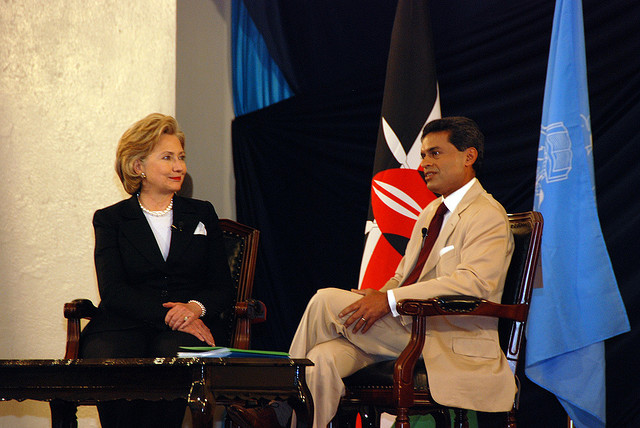
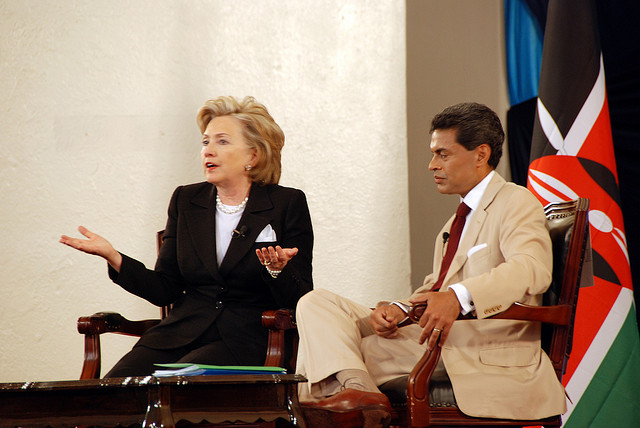
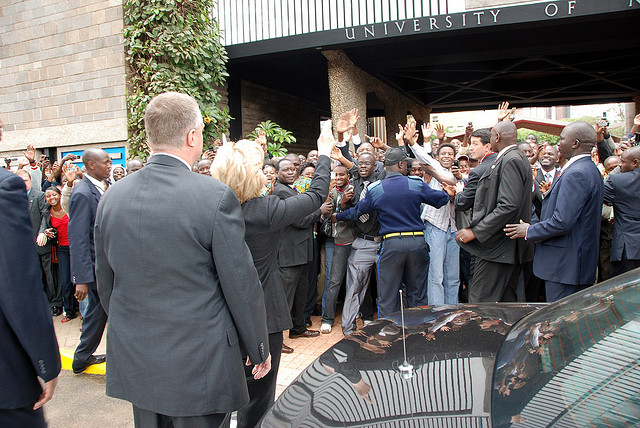
Hillary Clinton at the Kenya Agricultural Research Institute
August 5, 2009 by still4hill
Well-intentio9ned
as they were, she notes that U.S. (and other) gifts of foodstuffs
undercut the market for indigenous agricultural products. She points to
the Feed the Future Program as one that supports local produce and addresses the challenge of transportation.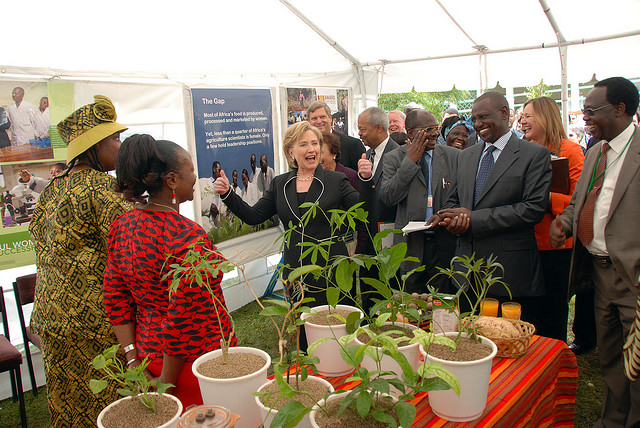

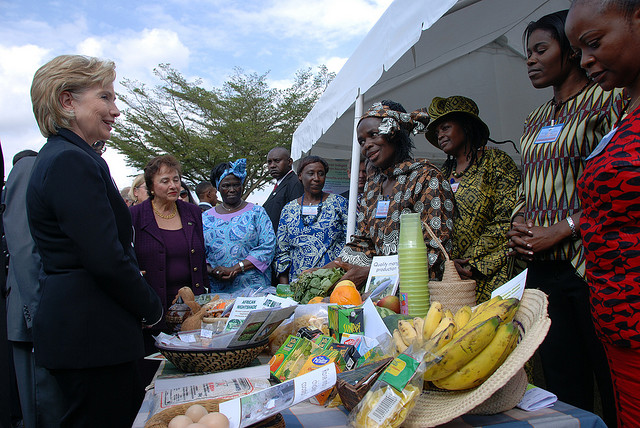
Hillary Clinton With Kenyan Foreign Minister Moses Wetangula
August 5, 2009 by still4hill
She also met with President Kibaki, Prime Minister Odinga, and the cabinet. There was tough talk, to which she refers, in this meeting but no transcript from the State Department. The agreed-upon shared power in the government was not going smoothly. Her subsequent words with Foreign Minister Wetangula provide some insight into the tone she adopted, however.
The United States worked hard last year with Kofi Annan and the team of African Eminent Persons to support the Kenyan people to resolve the crisis that afflicted this country. Unfortunately, resolving that crisis has not yet translated into the kind of political progress that the Kenyan people deserve. Instead, the absence of strong and effective democratic institutions has permitted ongoing corruption, impunity, politically motivated violence, human rights abuses, and a lack of respect for the rule of law.
These conditions helped fuel the post-election violence, and they are continuing to hold Kenya back. The reform agenda agreed to by the coalition government and discussed in the speech that President Kibaki and Prime Minister Odinga gave this morning must be fully implemented not just to avoid a repeat of the previous crisis or worse, but more importantly, to set the stage for a better future, a future worthy of the dynamic people of this country, a future of economic growth, democratic development, social justice, and the opportunity for every Kenyan child to live up to his or her God-given potential. I wanted the leaders to know that we respect greatly the way that the Kenyan people pulled their country back from the brink of disaster once, and the ongoing connection between the private sector, civil society, and the government that is the key to resolving these issues.
Hillary's description of her visit to Democratic Republic of Congo (DRC) in summer 2009 is a contrasting patchwork of horror and hope. She begins with her visit, with NBA star Dkembe Mutombo to the pediatric unit he built and named for his mother.
Hillary Clinton at the Biamba Marie Mutombo Hospital and Research Center
August 10, 2009 by still4hill
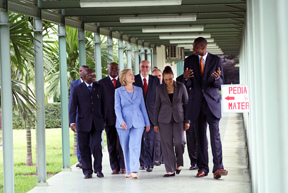
There were so many bright and lovely moments on this first official State tour of Africa. Most of those were, sadly, not covered by the media, but no one missed the "snap in the Congo." In an atmosphere that Hillary describes as sour with an air of sullen resignation in a stuffy auditorium at St. Joseph's School. everyone saw her lose patience with a question, remove her earbuds, and tell a student at a town hall that she would not be channeling her husband.
Hillary Clinton’s Town Hall With Search for Common Ground and Congolese University Students
August 10, 2009 by still4hill
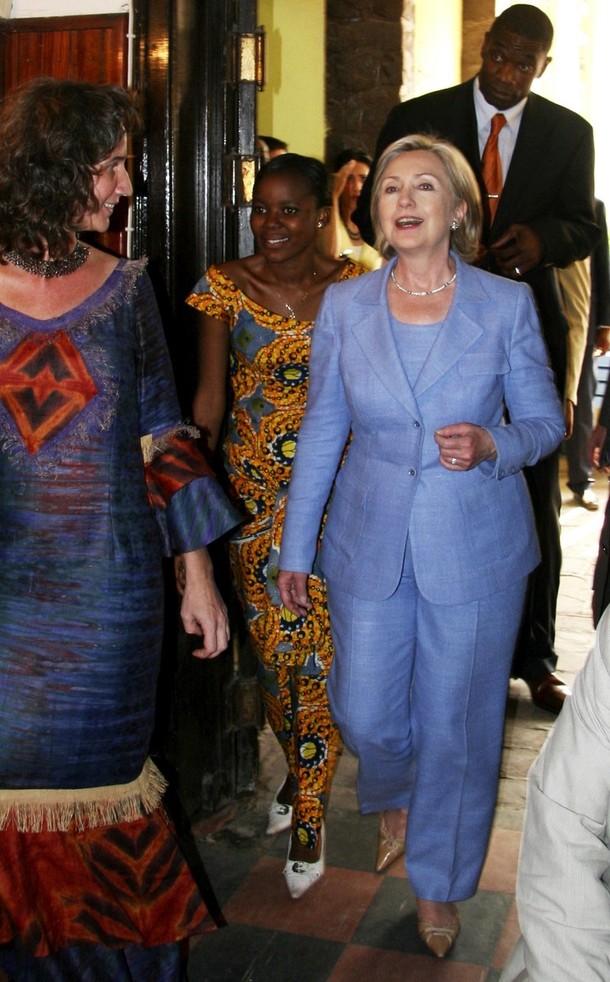
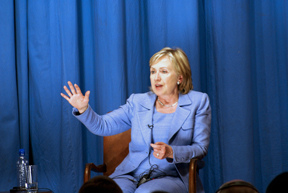
In the book, she explains that the student came to her after the event, apologized, and explained that he had not meant to ask her President Clinton's opinion but rather President Obama's.
Goma is one of the the grimmest, most dangerous places on earth, especially for women. Hillary tells of her visit there and the spirit she encountered among the residents of the refugee settlement she visited.
Hillary Clinton’s Day at the U.N. Internally Displaced Persons Camp, Goma, DRC
August 11, 2009 by still4hill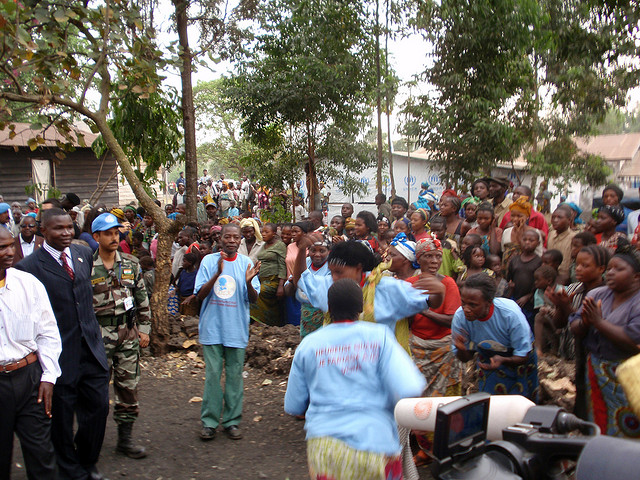
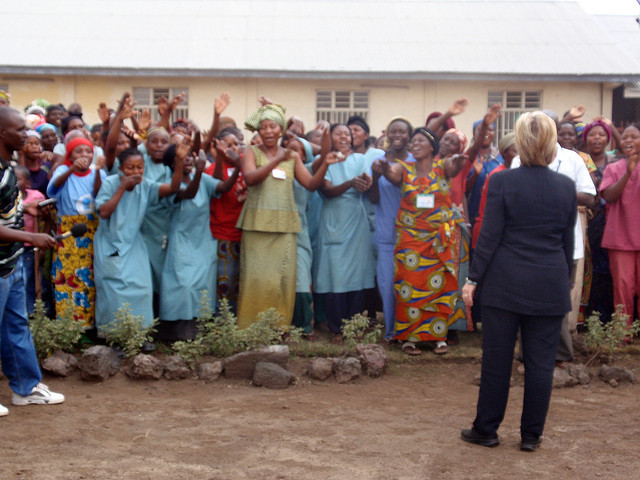
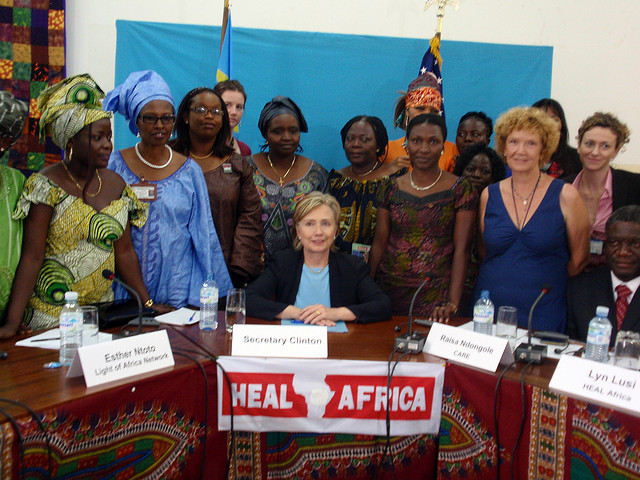
She says she witnessed the worst and the best of humanity there. She was inspired to chair a U.N. Security Council meeting the next month on the subject of sexual violence in conflict regions.
Secretary Hillary Clinton Chairing Security Council Meeting Today
September 30, 2009 by still4hill
Secretary Clinton & Ambassador Rice: Remarks After Meeting on the Adoption of a UNSC Resolution to Combat Sexual Violence in Armed Conflict
September 30, 2009 by still4hill
Hillary
turns at this point to her visit to Africa's and the world's newest
country, South Sudan in August 2012 when a standoff between the breakout
state and Sudan from which it had seceded was festering. South Sudan
had oil and Sudan had the ports and refineries. Clearly some kind of
cooperative agreement would benefit both, but South Sudan had shut down
the pipeline to the North.Hillary Clinton With Foreign Minister of South Sudan Nhial Deng Nhial
August 3, 2012 by still4hill
Hillary Clinton in South Sudan
August 3, 2012 by still4hill

The surface issue was fees charged by Sudan to transport and process the oil. Hillary used an Op-Ed by one of President Kir's former comrades-in-arms, Bishop Elias Taban, once a boy soldier. Below the surface, the dispute rested on old battle wounds. Hillary told him "a percentage of something is better than a percentage of nothing." Taban's words moved Kir to accept a compromise. By 2:45 the next morning, the oil flowed again.
Hillary Clinton Welcomes Oil Agreement Between Sudan and South Sudan, Calls for Peace and Humanitarian Access
August 4, 2012 by still4hill
Hillary
writes that South Sudan's future remains uncertain, and indeed, while
this post was being assembled the State Department issued this statement.Bishop Taban, who provided the instrument that convinced President Kir to budge was her guest at last year's Clinton Global Initiative where she presented him with the Global Citizen Award.
CGI 2013: Closing Plenary Session
September 26, 2013 by still4hill
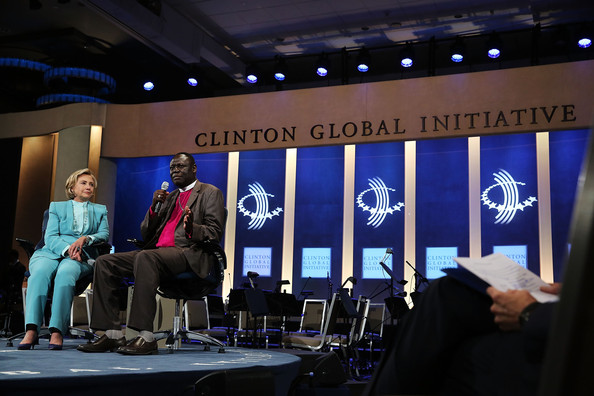
She reviews Somalia's war-torn, terror-ridden history and our efforts to assist through several U.S. administrations. In August 2009, the president of the transitional government traveled to Nairobi to meet with her. She wondered if he would shake her hand, and he did so very enthusiastically which was a very big deal all around.
Hillary Clinton With Somali Transitional Federal Government President Sheikh Sharif Sheikh Ahmed
August 7, 2009 by still4hill
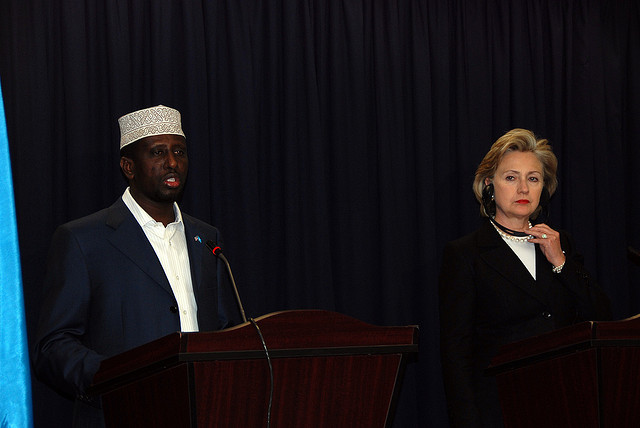
They met again for a final time in their respective official positions in August 2012. A new president was elected the next month.
Hillary Clinton With Somali Roadmap Signatories in Kenya
August 4, 2012 by still4hill

At a military base in Uganda, U.S. Special Operations advisors showed her a surveillance drone used in the search for Joseph Kony chief of the Lord's Resistance Army and elements of Al Shabaab. She notes that it resembled a child's toy.
Hillary Clinton at Kasenyi Military Base in Uganda
August 3, 2012 by still4hill


She mentions the September 2013 attack by Al Shabaab on a shopping mall in Nairobi that killed Elif Yavuz who worked for the Clinton Health Access Initiative which battles HIV/AIDS and other health challenges.
Bill, Hillary, and Chelsea Clinton Offer Condolences on the Death of Elif Yavuz
September 23, 2013 by still4hill

In the struggle to conquer HIV/AIDS on the continent, the President's Emergency Plan for AIDS Relief (PEPFAR) begun by George W. Bush plays a major role. She recalls this event in Johannesburg in 2009 where she was accompanied by Eric Goosby, the State Department's Global AIDS Coordinator, her Congressional Representative, Nita Lowey, and the late, Honorable Donald Payne who was a friend of this blog.
Hillary Clinton at PEPFAR Event in South Africa
August 8, 2009 by still4hill
Hillary declared a goal of an AIDS-free generation on World AIDS Day 2011.
Secretary Clinton on World AIDS Day 2011
December 1, 2011 by still4hill
Hillary Clinton at the Reach Out Mbuya Health Center, in Kampala, Uganda
August 3, 2012 by still4hill

Hillary begins drawing this Africa chapter to a close in South Africa around Nelson Mandela beginning with recollections of her visits to South Africa as First Lady, the second time bringing Chelsea with her. A lifetime friendship ensued.
Hillary Clinton with Nelson Mandela
August 8, 2009 by still4hill
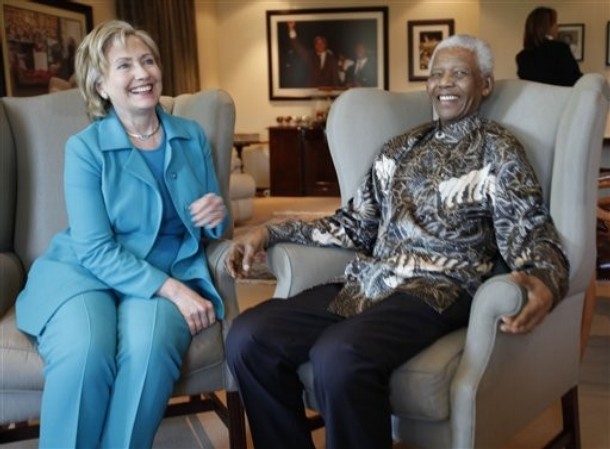
One working relationship that brought many smiles over the years was her friendship with South African Foreign Minister Maite Nkoana-Mashabane. She gave parties for Hillary on both of her visits. There was a rare snowfall on Hillary's last visit and she was called 'Nimkita' - one who brings the snow.
Hillary Clinton With South African Minister of International Relations Nkoana-Mashabane
August 8, 2009 by still4hill
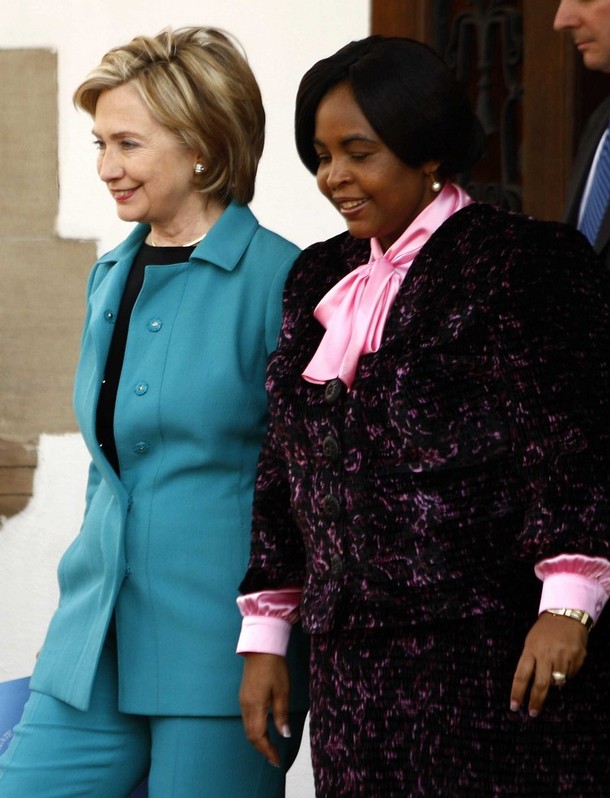
Hillary Clinton with South African Foreign Minister Maite Nkoana-Mashabane
August 7, 2012 by still4hill

Hillary Clinton’s Meeting With U.S. and South African Business Leaders
August 7, 2012 by still4hill
Hillary Clinton at a Dinner Hosted by South African Foreign Minister Maite Nkoana-Mashabane
August 7, 2012 by still4hill

Hillary Clinton at the U.S.-South Africa Business Partnership Summit
August 6, 2012 by still4hill
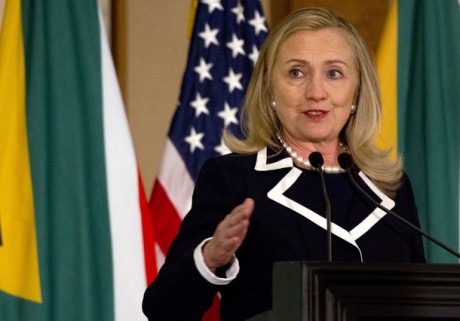
There was one last visit to Nelson Mandela.
Hillary Clinton Visits Nelson Mandela
August 6, 2012 by still4hill
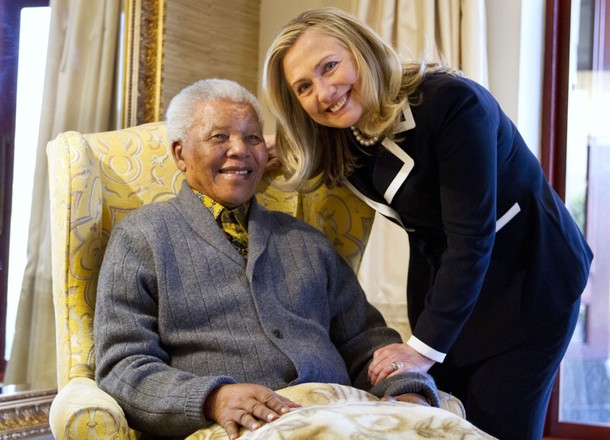
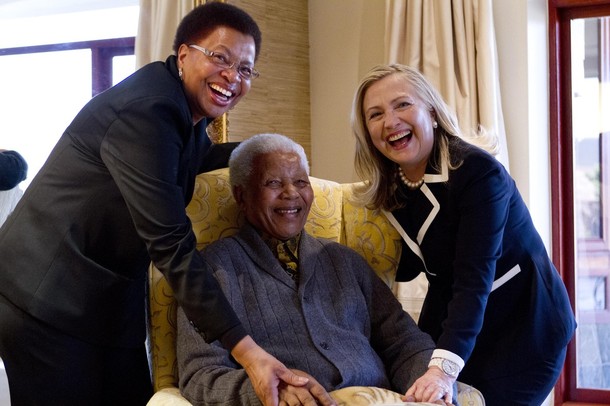
Hillary Clinton at The United States – South Africa Partnership
August 8, 2012 by still4hill

She refers to these closing remarks in this speech.
It’s a burden being an American or a South African, because people expect you to really live up to those standards. People hold us to a higher set of standards, don’t they? And we owe it to all who came before, all who sacrificed and suffered, to do our very best to keep working every single day to meet those standards. But we mostly owe it to our future.
Many things have changed since Robert Kennedy came to Cape Town and Nelson Mandela left Robben’s Island. But some have not. The world we want to build together still demands the qualities of youth and a predominance of courage over timidity. So in that spirit, let us work together so that the values that shaped both our nations may also shape a world that is more peaceful, more prosperous, and more just.
Clintons Close CGI in Rio and Convene in South Africa to Honor Nelson Mandela
December 10, 2013 by still4hill
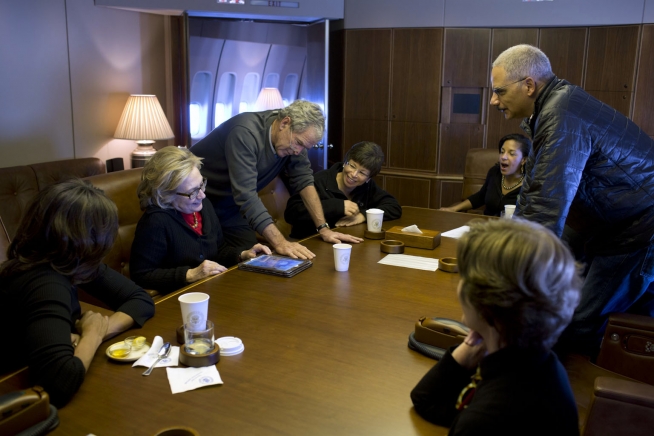
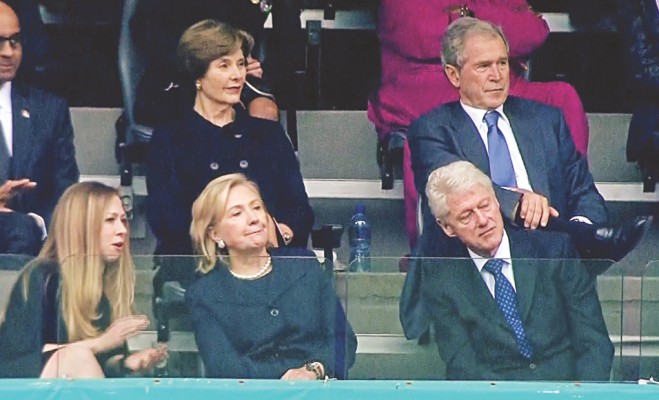
Hillary ends this chapter with hopes for an Africa worthy of Nelson Mandela's long walk to freedom.
###
Thursday, August 28, 2014
Hillary Clinton on Privacy and Data Protection
Hillary Clinton is one person on the world stage who most personally felt the impact of wikileaks since she was the one who had to make the "apology tour"
in late 2010 and early 2011. She spoke in San Francisco this morning
on issues surrounding privacy of electronic data. No transcript is
available, but this account appears to be fair and balanced.

In the wake of wikileaks, everyone expected her meeting with Angela Merkel (and other world leaders) to be awkward. Her charm offensive defused a potentially explosive situation.
Hillary Clinton talks NSA and privacy, data security, tech jobs in San Francisco
Summary: "I'm not an expert on software-defined storage or the intricacies of cloud computing," Clinton quipped.By Rachel King for Between the Lines | August 28, 2014SAN FRANCISCO---Privacy and security are in a necessary but inevitable tension, reflected former Secretary of State Hillary Clinton while speaking at data storage and software provider Nexenta's OpenSDx Summit on Thursday.
Proposing this debate has been going on in the United States since the days of the Founding Fathers (with Clinton trading out "privacy" for "liberty"), Clinton observed how concerns over privacy reached a fever pitch following the revelations about the National Security Agency last year.
Read more >>>>
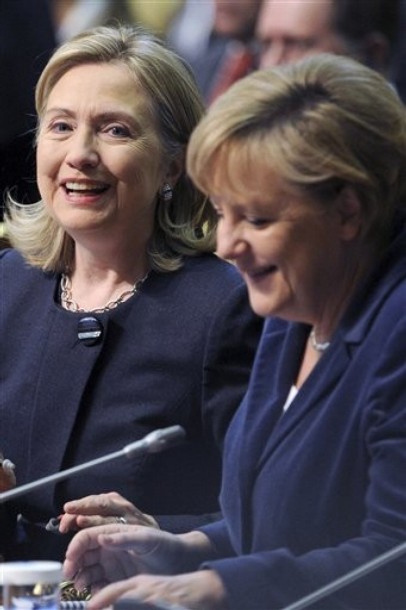
In the wake of wikileaks, everyone expected her meeting with Angela Merkel (and other world leaders) to be awkward. Her charm offensive defused a potentially explosive situation.
From Hillary Clinton's Too Small to Fail: Bilingual Advantages
It is important for parents of bilingual children to understand that
they often start speaking a little later than monolingual children
because they are processing more information. The delay is normal.
No Matter the Language, Babies Thrive on Communication
One language sets you in a corridor for life. Two languages open every door along the way. —Frank Smith, psycho-linguist from Harvard University
Researchers who study language and brain development have noted the difference in brain structure between children who speak only one language, and those that speak two or more. Children who spend their early years in homes where they hear more than one language spoken – or a primary language that is different from the one they hear in the outside world – tend to better develop and exercise the executive function of their brains, which helps to improve learning. As a result, these dual language learners may have better memory, logic and attention skills than their monolingual peers.
Dual language learners may also have better social and emotional skills than monolinguals. Early research into the subject is showing that children who grow up hearing more than one language tend to have more self-control, and fewer behavior problems later in life.
While not every preschooler needs to be bilingual, it is helpful for parents and caregivers to talk, read and sing with their children in their native language, even if it’s not English. In fact, the more language a baby hears during their first years in their native language, the better prepared they will be to learn English and other subjects when they enter school.
Resources for Sharing:
- These tips for parents from Reading Rockets (available in more than ten languages!) are meant to encourage a child’s love of reading.
- These tips and videos from American-Speech-Language-Hearing Association explain the benefits of dual language learning.
- Too Small to Fail’s tips for parents of dual language learners are available in English and Spanish.
- From our neighbors to the North, this video explains how babies learn language and how parents and caregivers can encourage that development
Video
Popular children’s songwriter and performer Jose Luis Orozco sings in Spanish, and encourages parents and children to sing along! >>
Wednesday, August 27, 2014
Hillary Clinton’s ‘Hard Choices’ Retrospective Part Four Chapter 12 Latin America: Democrats and Demagogues
Beginning with a brief history of U.S. Latin American policy from the Cold War to the current administration, Hillary
A. Cites Clinton administration initiatives:
C. Cites President Obama's promise, in his April 2009 Summit of the Americas speech, of a new "equal partnership" relationship with the region and a fairer Cuba policy.
She does not mention this encounter with Hugo Chavez at that summit, but the picture is priceless.
She choose Mexico as her starting point to implement the new policy. She was familiar with the border area from her 1972 campaign experiences there. She and her then campaign colleague Bill Clinton had gone south of the border to a beach on a recovery vacation after the election.
She had fond memories of Mexico, but attacks on consulates in 2008 and 2010, the last with murders involved, indicated the dangers civil servants faced. Her first trip to Mexico as secretary of state was in March 2009. Patricia Espinosa is one of several strong Latin American women leaders with whom she formed a strong bond.



She doesn't mention this but I shall. She surprised the rector at the Basilica of Our Lady of Guadalupe with an unscheduled visit the morning of her second day there. He was delighted. That day she also held a round table with indigenous students from community colleges, visited an industrial plant, and then gave the speech in Monterrey at TecMilenio University that she does refer to in her book. It was a spectacular two days that we celebrated here.






This was the Mexico visit she refers to when President Calderon was furious over the wikileaks and demanded that Ambassador Pascual be replaced - said he could no longer work with him. She states that Pascual resigned in March 2011. If anyone tries to tell you that wikileaks caused no damage, be skeptical. This was only the tip of a very large and damaging iceberg. Thank heaven Hillary had a great relationship with Patricia Espinosa and with the Mexican people.




As a model for Mexico, she suggests Colombia and reviews the Clinton administration effort called Plan Colombia, a joint effort of her husband's administration with then President Pastrana. The initiative continued and expanded under the Bush administration, but human rights issues arose. The Obama administration continued the plan but with additional work on governance, education, and development.
Her first visit to Colombia as secretary of state happened to coincide with a visit Bill Clinton was making there. It was the first time they were together on foreign soil since she had assumed her post. They actually managed a dinner date and a peaceful evening walk through Bogota. She remarks on the contrast with the violence of the past.

In her meeting with President Uribe the following day he also comments upon the dramatic security progress in the capital.

Uribe was near the end of his term at this point. His successor, Juan Manuel Santos continued the progress and improvement continues, she states.
Hillary attended the presidential inauguration in El Salvador in June 2009 that dovetailed with the Pathways to Prosperity Ministerial Summit.

A
model she suggests for conquering poverty in Latin America is Brazil's
conditional cash tranfer programs. Dating back to the 1990s under
President Cardoso and expanded by President Lula da Silva, it transfers
cash to parents as a reward for keeping children in school and under
proper pediatric supervision. Lula's successor, Dilma Rousseff was
inaugurated on January 1, 2011, and Hillary was happy to be there there.

She encountered Chavez there again.

She departed El Salvador for Honduras where she attended CARICOM and the OAS Summit.
There
was suspense and high drama at the June 2009 OAS summit. Several
members intended to put forth a resolution to readmit Cuba. The
proponents were the predictable suspects, Hugo Chavez of Venezuela,
Nicaragua's Daniel Ortega, and Mel Zelaya of Honduras was also leaning
that way. More moderate countries like Chile and Brazil were
considering approval. Cuba was not represented at the summit and had
expressed no interest. The concern was that if a vote was called a
simple 2/3 majority could and might approve since Cuba was originally
excluded based on outdated Cold War standards.
The U.S. strategy involved updating the standards to focus on democracy and human rights and to require that the petition be presented by the Cuban government rather than by proxy. There was also a timing issue since Hillary was scheduled to fly to Cairo to attend the much-anticipated speech Obama was to deliver there.
The vote was not called before Hillary had to leave, but the U.S. compromise plan did prevail. Castro reacted by refusing to petition for readmission.
In
December 2009 the Castro regime arrested USAID worker Alan Grossman.
Hillary says one of her biggest regrets is that she was not able to
bring him home. Before leaving office she recommended reassessing the
Cuba embargo and shifting the onus to the Cuban government.
In mid-June, (she does not mention this, but I will) Hillary slipped in the State Department parking garage and fractured her elbow. I add this because a subsequent press briefing refers to it.
Here she spoke at length about the coup in Honduras.

On
July 7, Zelaya made his way to D.C. and visited Hillary at the State
Department. She had recruited Costa Rica's President Óscar Arias to
mediate. Zeleya accepted mediation and from that point all that came
before was wiped clean. It was a new playing field. Hillary stipulates
that she made the announcement alone so as not to appear to Micheletti
as if Zelaya was being favored.
Zelaya
remained in exile. Arias was encountering a hard line on both sides
and was in favor of restoring Zelaya to power based on principles.
Allowing the de facto government to stay would, he said, have a domino
effect across the region.
In September, Zelaya returned to the State Department. There were no remarks or press briefings, only this photo. Immediately afterwards he turned up at the Brazilian Embassy in San Pedro Sula.
At the end of October a unity agreement was in place. The Honduran Congress voted not to restore Zelaya. He went to the Dominican Republic. November elections were held and Porfirio Lobo was elected. Many OAS countries disagreed with this solution, but in May 2011 Honduras was readmitted.

It was, Hillary notes, the first time in Central American history that a coup was resolved democratically. She concludes that the trend in Latin American is toward democracy, shared opportunities, positive partnerships, and innovation.
A. Cites Clinton administration initiatives:
- The first Summit of the Americas in 1994,
- The successful anti-narcotrafficking and anti-guerrilla Plan Colombia,
- The restoration of the democratically elected Bertrand Aristede to his post in Haiti;
C. Cites President Obama's promise, in his April 2009 Summit of the Americas speech, of a new "equal partnership" relationship with the region and a fairer Cuba policy.
She does not mention this encounter with Hugo Chavez at that summit, but the picture is priceless.
She choose Mexico as her starting point to implement the new policy. She was familiar with the border area from her 1972 campaign experiences there. She and her then campaign colleague Bill Clinton had gone south of the border to a beach on a recovery vacation after the election.
She had fond memories of Mexico, but attacks on consulates in 2008 and 2010, the last with murders involved, indicated the dangers civil servants faced. Her first trip to Mexico as secretary of state was in March 2009. Patricia Espinosa is one of several strong Latin American women leaders with whom she formed a strong bond.
Hillary Clinton in Mexico with Women Leaders and Foreign Secretary Patricia Espinosa
March 26, 2009 by still4hill

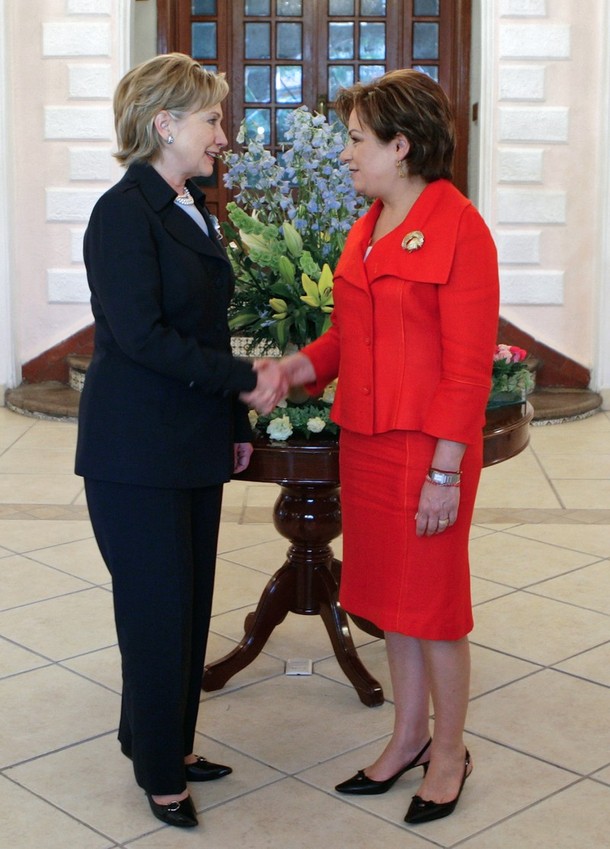
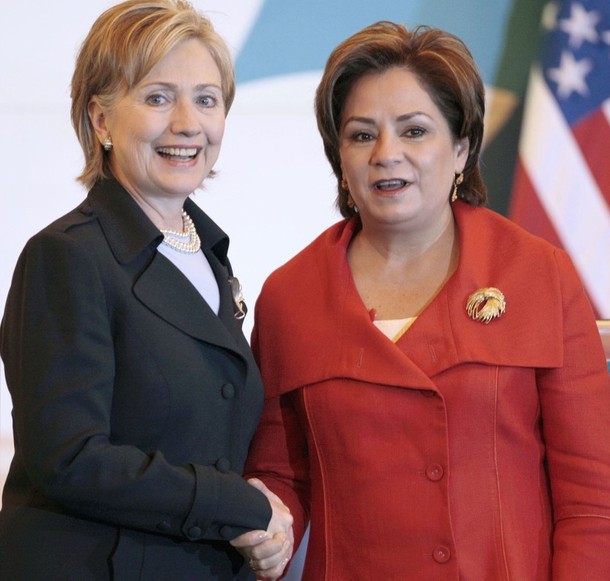
She doesn't mention this but I shall. She surprised the rector at the Basilica of Our Lady of Guadalupe with an unscheduled visit the morning of her second day there. He was delighted. That day she also held a round table with indigenous students from community colleges, visited an industrial plant, and then gave the speech in Monterrey at TecMilenio University that she does refer to in her book. It was a spectacular two days that we celebrated here.
Hillary Clinton in Mexico Day 2
March 27, 2009 by still4hill
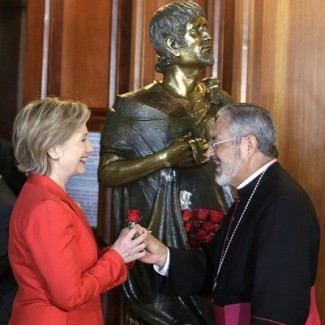

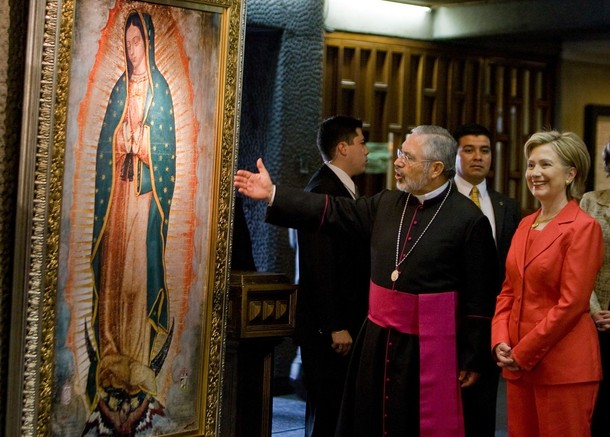
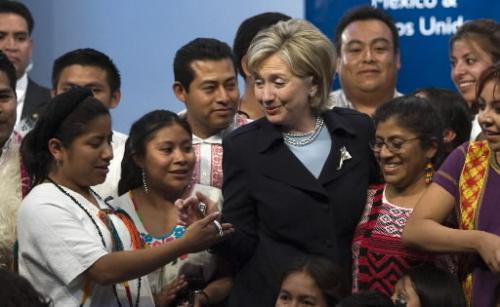
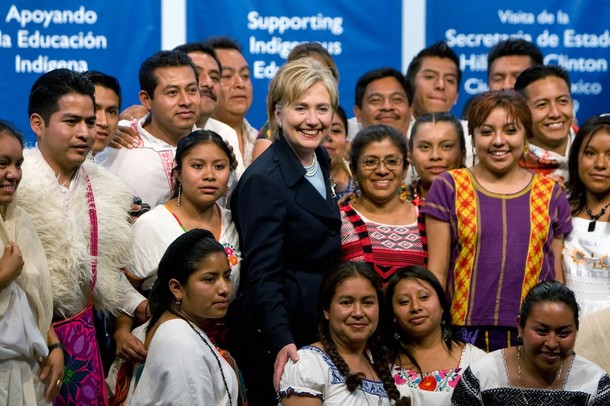

This was the Mexico visit she refers to when President Calderon was furious over the wikileaks and demanded that Ambassador Pascual be replaced - said he could no longer work with him. She states that Pascual resigned in March 2011. If anyone tries to tell you that wikileaks caused no damage, be skeptical. This was only the tip of a very large and damaging iceberg. Thank heaven Hillary had a great relationship with Patricia Espinosa and with the Mexican people.
Hillary Clinton in Mexico
January 24, 2011 by still4hill
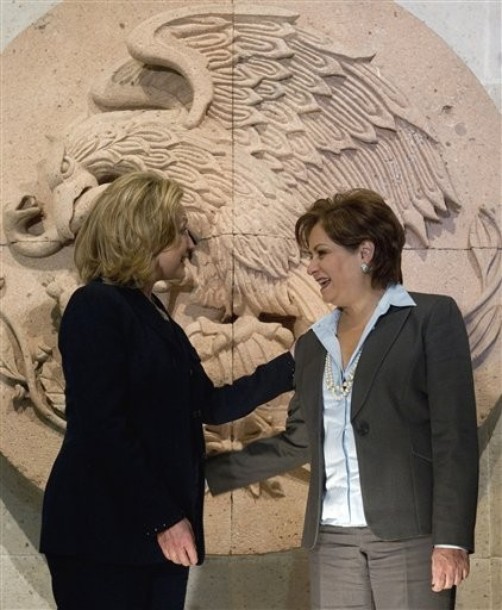
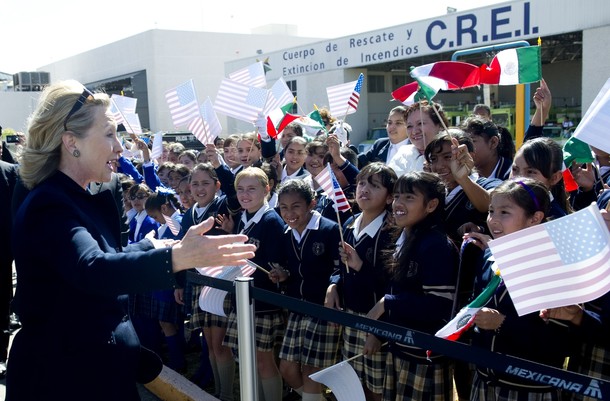
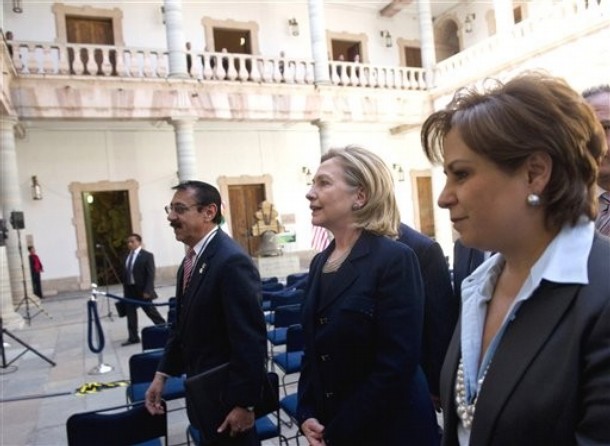
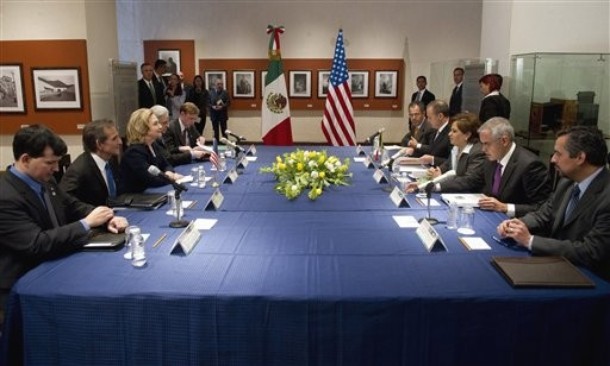
Secretary Clinton’s Remarks With Mexican Foreign Secretary Patricia Espinosa
January 24, 2011 by still4hill
Secretary Clinton’s Interview With Denise Maerker of Televisa
January 25, 2011 by still4hill
Secretary Clinton’s Interview With Rossana Fuentes of CNN en Espanol
January 25, 2011 by still4hill
As a model for Mexico, she suggests Colombia and reviews the Clinton administration effort called Plan Colombia, a joint effort of her husband's administration with then President Pastrana. The initiative continued and expanded under the Bush administration, but human rights issues arose. The Obama administration continued the plan but with additional work on governance, education, and development.
Her first visit to Colombia as secretary of state happened to coincide with a visit Bill Clinton was making there. It was the first time they were together on foreign soil since she had assumed her post. They actually managed a dinner date and a peaceful evening walk through Bogota. She remarks on the contrast with the violence of the past.
Bill and Hillary Clinton: The Tryst
June 10, 2010 by still4hill

In her meeting with President Uribe the following day he also comments upon the dramatic security progress in the capital.
Secretary Clinton’s Joint Press Availability with Colombian President Alvaro Uribe
June 10, 2010 by still4hill
This morning, I was saying to some members of the media that were here (inaudible) that the best PR for confidence in Colombia is that last night, the Madam Secretary of State of the United States and the president, Bill Clinton, were in a restaurant in Bogota with complete peace of mind enjoying this beautiful city and its good restaurants. Some years ago, because of terrorism, this would have been unthinkable. Your visit, the fact that you spent the night in Bogota, the frequent visits by President Clinton, those are a great show of confidence in Colombia and the fact that one can have confidence in Colombia.
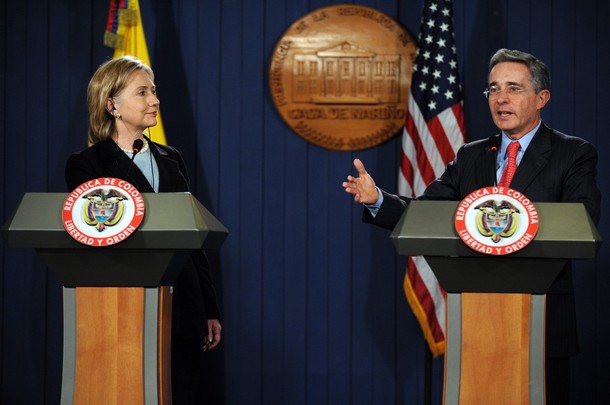
Uribe was near the end of his term at this point. His successor, Juan Manuel Santos continued the progress and improvement continues, she states.
Hillary attended the presidential inauguration in El Salvador in June 2009 that dovetailed with the Pathways to Prosperity Ministerial Summit.
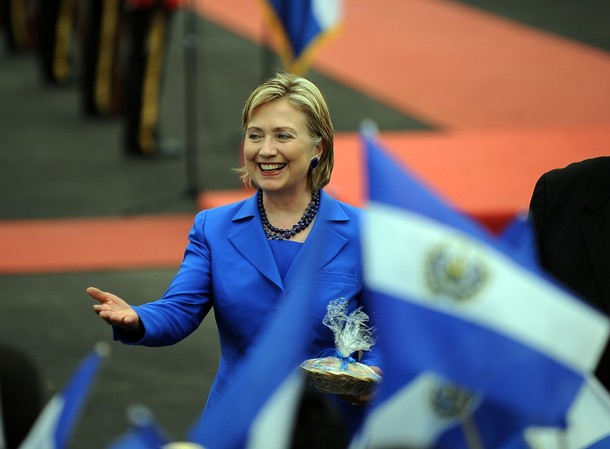
Hillary Clinton at the Pathways to Prosperity Ministerial in El Salvador
May 31, 2009 by still4hill
Hillary Clinton Op-Ed: New Pathways to Prosperity in the Americas
June 1, 2009 by still4hill
Secretary Clinton at the Inauguration of Dilma Rousseff
January 1, 2011 by still4hill

She encountered Chavez there again.

She departed El Salvador for Honduras where she attended CARICOM and the OAS Summit.
Hillary Clinton at CARICOM Breakfast
June 2, 2009 by still4hill
The U.S. strategy involved updating the standards to focus on democracy and human rights and to require that the petition be presented by the Cuban government rather than by proxy. There was also a timing issue since Hillary was scheduled to fly to Cairo to attend the much-anticipated speech Obama was to deliver there.
The vote was not called before Hillary had to leave, but the U.S. compromise plan did prevail. Castro reacted by refusing to petition for readmission.
Press Statement: OAS Resolution
June 4, 2009 by still4hill
In mid-June, (she does not mention this, but I will) Hillary slipped in the State Department parking garage and fractured her elbow. I add this because a subsequent press briefing refers to it.
Hillary’s Fractured Elbow
June 19, 2009 by still4hill
In
late June 2009, just weeks after Hillary had been at OAS in San Pedro
Sula, the democratically-elected president of Honduras, Mel Zelaya, was
arrested and put, in his pajamas, on a plane to Costa Rica. His wife
and daughters requested refuge at our embassy residence and Hillary
ordered that they be kept safe. The President of the National Congress
Roberto Micheletti, assumed power. U.S. aid was suspended (by law) as
was OAS membership.Hillary Clinton: Situation in Honduras
June 28, 2009 by still4hill
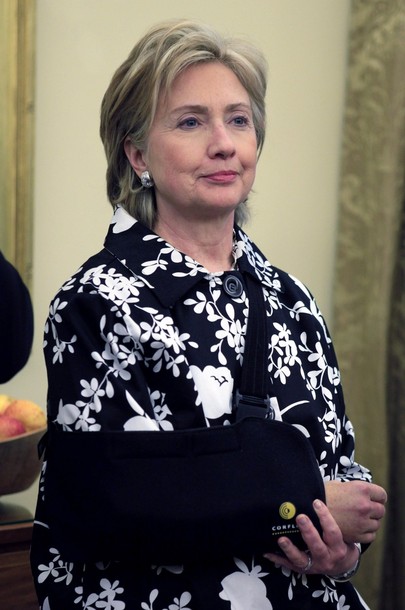
Hillary Clinton’s Press Briefing After Breaking Her Elbow
June 29, 2009 by still4hill
Hillary Clinton: Remarks at the Top of the Daily Press Briefing
July 7, 2009 by still4hill
In September, Zelaya returned to the State Department. There were no remarks or press briefings, only this photo. Immediately afterwards he turned up at the Brazilian Embassy in San Pedro Sula.
At the end of October a unity agreement was in place. The Honduran Congress voted not to restore Zelaya. He went to the Dominican Republic. November elections were held and Porfirio Lobo was elected. Many OAS countries disagreed with this solution, but in May 2011 Honduras was readmitted.
Hillary Clinton Hails Return of Honduras to OAS
May 23, 2011 by still4hill

It was, Hillary notes, the first time in Central American history that a coup was resolved democratically. She concludes that the trend in Latin American is toward democracy, shared opportunities, positive partnerships, and innovation.
Subscribe to:
Comments (Atom)


